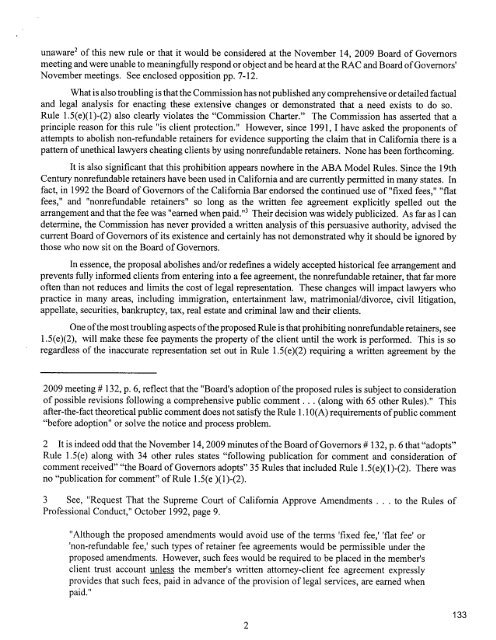Sorted by Commenter - Ethics - State of California
Sorted by Commenter - Ethics - State of California
Sorted by Commenter - Ethics - State of California
Create successful ePaper yourself
Turn your PDF publications into a flip-book with our unique Google optimized e-Paper software.
unaware 2 <strong>of</strong> this new rule or that it would be considered at the November 14 , 2009 Board <strong>of</strong> Governors<br />
meeting and were unable to meaningfully respond or object and be heard at the RAC and Board <strong>of</strong> Governors<br />
November meetings. See enclosed opposition 12.<br />
What is also troubling is that the Commission has not published any comprehensive or detailed factual<br />
and legal analysis for<br />
Rule Commission Charter." The Commission has<br />
principle reason for this rule "is client protection. " However, since 1991 , I have asked the proponents <strong>of</strong><br />
attempts to abolish non-refundable retainers for evidence supporting the claim that in <strong>California</strong> there is a<br />
pattern <strong>of</strong> unethical lawyers cheating clients <strong>by</strong> using nonrefundable retainers. None has<br />
It is also significant that this prohibition appears nowhere in the ABA Model Rules. Since the 19th<br />
Century nonrefundable retainers have been used in <strong>California</strong> and are currently permitted in many states. In<br />
fact, in 1992 the Board <strong>of</strong> Governors <strong>of</strong> the <strong>California</strong> Bar endorsed the continued use <strong>of</strong> "fixed fees flat<br />
fees " and "nonrefundable retainers " so long as the written<br />
arrangement and that the fee was "earned when paid.<br />
determine, the Commission has never provided a written analysis <strong>of</strong> this persuasive authority, advised the<br />
current Board <strong>of</strong> Governors <strong>of</strong> its existence and certainly has not demonstrated why it should be ignored <strong>by</strong><br />
those who now sit on the Board <strong>of</strong> Governors.<br />
In essence, the proposal abolishes and/or redefines a widely accepted historical fee arrangement and<br />
prevents fully informed clients from entering into a fee agreement, the nonrefundable retainer, that far more<br />
<strong>of</strong>ten than not reduces and limits the cost <strong>of</strong> legal representation. These changes will impact lawyers who<br />
practice in many areas, including immigration, entertainment law, matrimonial/divorce, civil litigation<br />
appellate, securities, bankruptcy, tax, real estate and criminal law and their clients.<br />
One <strong>of</strong>the mosttroubling aspects <strong>of</strong> the proposed , see<br />
1.5(e)(2), will make these fee payments the property <strong>of</strong> the client until the work is performed.<br />
regardless <strong>of</strong> the inaccurate representation set out in Rule 1.5(e)(2)<br />
2009 meeting # 132, p. 6, reflect that the "Board' s adoption <strong>of</strong> the proposed rules is subject to consideration<br />
<strong>of</strong> possible revisions following a comprehensive public comment. . . " This<br />
after-the- fact theoretical 1 O(A)<br />
before adoption" or solve the notice and process problem.<br />
It is indeed odd that the November 14 2009 minutes <strong>of</strong> the Board <strong>of</strong> Governors # 132, p. 6 that "adopts<br />
Rule following publication for comment and consideration <strong>of</strong><br />
comment received" "the Board <strong>of</strong> Governors adopts" 35 Rules that included Rule 1.5(e)(1)-(2). There was<br />
no "publication for comment" <strong>of</strong> Rule 1.5(<br />
3 See<br />
, "<br />
Request That the<br />
Pr<strong>of</strong>essional Conduct " October 1992, page 9.<br />
Although the proposed amendments would avoid use <strong>of</strong> the terms 'fixed fee,' 'flat fee' or<br />
non-refundable fee,' such types <strong>of</strong> retainer fee agreements would be permissible<br />
proposed amendments. However, such fees would be required to be placed in the member<br />
client trust account unless the member s written attorney-client fee<br />
provides that such fees, paid in advance <strong>of</strong> the provision <strong>of</strong> legal services, are earned when<br />
paid.<br />
" "<br />
133












![Proposed Rule 4.1 [N/A] “Truthfulness in Statements to Others” - Ethics](https://img.yumpu.com/19037854/1/190x245/proposed-rule-41-n-a-truthfulness-in-statements-to-others-ethics.jpg?quality=85)



